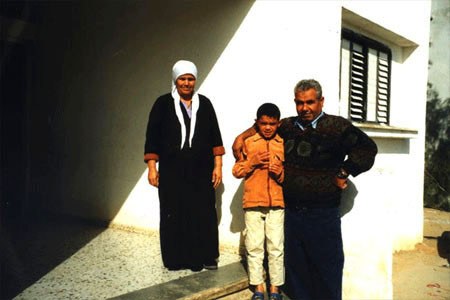
Umm Azmi with Abu Azmi and youngest son, Rahat, April 2000.
|
 Umm Azmi with Abu Azmi and youngest son, Rahat, April 2000. |
| Umm Azmi al-Tayf, Rahat, March 30:
|
|
The mother of 15 children, Umm Azmi is a sweet-faced woman who, unlike every other Palestinian woman I've met here, is completely denuded of even the simplest bodily ornaments. No gold at all. This is because Abu Azmi has used all her dowry to pay the lawyer for his land case. This was the situation in 1998, and it seems still to be the situation now, though I notice several other signs of improvement. They have a telephone now. There has been expansion of their house for married sons - the oldest son's section is completely separate from his parents now, and he has set up his car-repair business in the yard, employing several labourers.
Though she has moved house several times, Umm Azmi doesn't really fit my criteria since she hasn't been forcibly displaced. Born to a refugee family in Gaza, originally from the Nagab, she left Gaza to marry Abu Azmi. They lived in at least two different places before moving to Rahat. Rahat is one of the seven 'legal' townships that the authorities have encouraged bedouin to move to, through a mixture of coercion and promises -- permission to acquire land and build legally, also urban services. Originally from a peasant land-owning family, Abu Azmi's family is somewhat isolated in Rahat, where all their neighbours are bedouin.
Umm Azmi begins speaking: |
marriage took place. We took a house in Farrukhia. Again his situation was hard. He grew up an orphan and his life was very difficult. He worked for what? Just two or three pounds. When his situation improved a bit, the Jews came and took his land. Whatever he earned from his work he used to put for the land, or for the lawyer. My children also had a difficult time. There was no subject for them to learn. (Where was your first house?) We were living in Surif. After Surif we moved and built this house. We sold the iron of the house for the land, and the price of a carpet. And my gold went to the lawyer..."
It isn't easy to find people to record with in Rahat. It's not a real community yet, but an ensemble of different tribal segments. But I succeed in finding the office of Muhammad Yunis, editor of Akhbar al-Nagab. He's computerized now, and hopes soon to open a cultural and educational center in Rahat, stock it with books and films, give classes to strengthen students facing exams ('ta'wiyya'). Today there's a general strike for Land Day. No taxis on the street. Later I hear that many Rahat people went out on a protest march and were turned back by Israeli forces after a scuffle. It was the first time this had happened, but the person who reported the event to me complained that the Islamicists had insisted on their right, because of their bigger numbers, to head the march. In the afternoon, two of Umm Azmi's daughters take me for a stroll in the neighbourhood to see the house that the fiancé; of one of them is building. They say they wouldn't have been able to take this walk without my presence. All the residents here are from the Huza'el tribe. There aren't many people on the street though it isn't really hot yet. The unfinished house has three floors. I comment on its size. They say that Jamil has worked 'a lot' to pay for the land and building, the work of three years. His mother and sisters will move into the ground floor. |
[Rahat] [Umm Tamim] Copyright©2005 |
|